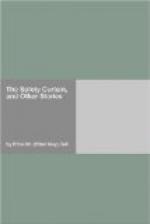She gave him the lightest caress imaginable, shook hands affectionately with young Harley, who was looking decidedly less pinched than he had upon arrival, and stood waving an energetic hand as they went away into the dripping dark.
“You didn’t tell her—anything?” Merryon asked, as they plunged down the road.
“Not more than I could help, Major. But she seemed to know without.” The lad spoke uncomfortably, as if against his will.
“She asked questions, then?” Merryon’s voice was sharp.
“Yes, a few. She wanted to know about Forbes and Robey. Robey is awfully bad. I didn’t tell her that.”
“Who is looking after them?” Merryon asked.
“Only a native orderly now. The colonel and Macfarlane both had to go to the barracks. It’s frightful there. About twenty cases already. Oh, hang this rain!” said Harley, bitterly.
“But couldn’t they take them—Forbes, I mean, and Robey—to the hospital?” questioned Merryon.
“No. To tell you the truth, Robey is pegging out, poor fellow. It’s always the best chaps that go first, though. Heaven knows, we may be all gone before this time to-morrow.”
“Don’t talk like a fool!” said Merryon, curtly.
And Harley said no more.
They pressed on through mud that was ankle-deep to the barracks.
There during all the nightmare hours that followed Merryon worked with the strength of ten. He gave no voluntary thought to his wife waiting for him in loneliness, but ever and anon those blazing eyes of hers rose before his mental vision, and he saw again that brave, sweet smile with which she had watched him go.
The morning found him haggard but indomitable, wrestling with the difficulties of establishing a camp a mile or more from the barracks out in the rain-drenched open. There had been fourteen deaths in the night, and seven men were still fighting a losing battle for their lives in the hospital. He had a native officer to help him in his task; young Harley was superintending the digging of graves, and the colonel had gone to the bungalow where the two stricken officers lay.
Dank and gruesome dawned the day, with the smell of rot in the air and the sense of death hovering over all. And there came to Merryon a sudden, overwhelming desire to go back to his bungalow beyond the fetid town and see how his wife was faring. She was the only white woman in the place, and the thought of her isolation came upon him now like a fiery torture.
It was the fiercest temptation he had ever known. Till that day his regimental duties had always been placed first with rigorous determination. Now for the first time he found himself torn by conflicting ties. The craving for news of her possessed him like a burning thirst. Yet he knew that some hours must elapse before he could honestly consider himself free to go.
He called an orderly at last, finding the suspense unendurable, and gave him a scribbled line to carry to his wife.




